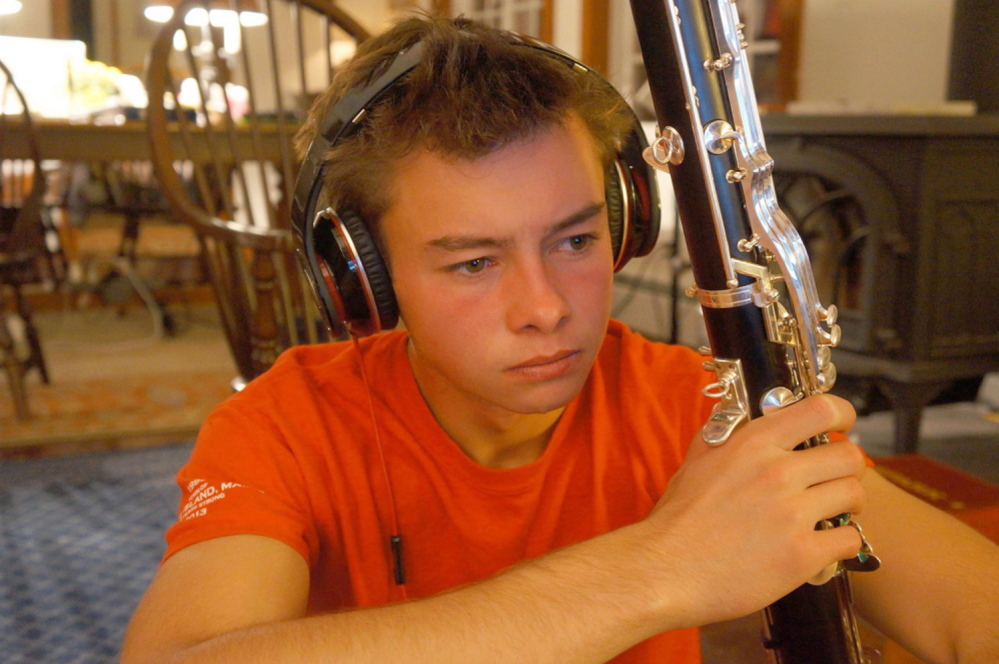Benjamin LaMontagne, the 18-year-old Cheverus High School student who died in February after routine oral surgery, was killed by a rare, aggressive bacterial infection that caused swelling of his jaw and neck, according to the state Medical Examiner’s Office.
The medical examiner’s report, released Thursday to the Portland Press Herald in response to a public records request, lists the cause of death as cervical necrotizing fasciitis, commonly called “flesh-eating bacteria.”
The infection is caused by a powerful strain of streptococcus A, a group of pathogens most commonly associated with strep throat, according to the National Necrotizing Fasciitis Foundation. It primarily damages the fascia, a layer of tissue that encases muscle, eventually causing the body to go into toxic shock and the organs to fail.
Symptoms of the infection began after LaMontagne had four wisdom teeth extracted on Feb. 19, according to the medical examiner’s report. After the procedure, the swelling of LaMontagne’s left jaw intensified and spread to his eyes. He could not swallow easily and was unable to eat.
By Feb. 22, the night he died at his home on Long Island, LaMontagne was dizzy and too weak to get to the bathroom. He took two painkillers and two antibiotic pills that night, but when he awoke about 11:30 p.m., he was too weak to stand and needed his mother’s help to crawl to the bathroom, according to the report.
LaMontagne’s mother left the room to find him clean clothing. When she returned, she found him on the toilet, leaning against a wall and breathing but unable to respond verbally. She called rescue workers, who pronounced him dead at the home a short time later, according to the report.
LaMontagne was a well-liked senior at Cheverus High who planned to attend Gettysburg College in Pennsylvania to study bass clarinet. His death stunned his school community and the tight group of families on Long Island, a town of about 230 residents less than a mile from Portland in Casco Bay.
His father, Peter LaMontagne, said Thursday that immediately before his son’s death, Ben LaMontagne was up and interacting with his family and friends and eating non-solid food regularly, and his condition did not appear to be getting worse.
Peter LaMontagne would not comment further, and would not identify the oral surgeon who did the surgery. He said the family has no plan to take legal action against the doctor.
About one in 20 people who have oral surgery experience some sort of infection, said Dr. Thomas Dodson, professor and chair of the Department of Oral and Maxillofacial Surgery at the University of Washington. The vast majority of those cases are treatable with oral antibiotics, and are caused by the many bacteria that are typically in the mouth and throat.
About three in 100,000 patients require more serious medical intervention at a hospital after oral surgery. Most of them survive, with medication and, in some cases, minor surgery.
Dodson said that in 30 years of performing oral surgery, including countless wisdom tooth extractions, he has treated only three cases of necrotizing fasciitis, and has advised colleagues on three cases. None, in his experience, have been fatal, although hospitalization is usually long and complicated.
“It’s usually like a two- to four-week slog,” Dodson said. “Usually, they’re in the (intensive care unit) for most of that time, they’re going back to the operating room many times (to have dead tissue removed).”
Dodson, who has no direct knowledge of LaMontagne’s case, hypothesized that the infection that killed him could have begun days before the surgery, putting his death more in line with the four- to eight-day period when infections often become most serious.
“I think the pond is a lot deeper here than it looks. To have someone have that happen to them at home and die, it’s very peculiar,” he said.
Dr. Eric Geist, president of the American Association of Oral and Maxillofacial Surgeons, said it was the first death caused by necrotizing fascitiis after oral surgery that he has heard of in 30 years of practice.
Among the handful of serious syndromes that can be caused by invasive streptococcus A infections, necrotizing fasciitis is particularly rare, according to the national Centers for Disease Control and Prevention, which estimates that 600 to 850 cases occur nationally each year.
In 2012, the most recent year for which detailed data is available, the CDC monitored streptococcus A-related infections in a study group of more than 32.7 million Americans and found that, of the 1,117 cases reported in that group, 75 were attributed to necrotizing fasciitis, about 6.7 percent. There were fewer cases of only one other syndrome, streptococcal toxic shock – 40 reported in the study group.
Although there was no specific CDC data on how often necrotizing fasciitis is fatal, the number of deaths attributed to all streptococcus A-related infections, at 116, represents a rate of about 0.35 deaths per 100,000 people.
In Maine in 2012, the latest year for which statistics are available, 37 cases of invasive streptococcus A infections were reported, five of them fatal. The state did not have readily available statistics on whether any involved necrotizing fasciitis.
Send questions/comments to the editors.




Success. Please wait for the page to reload. If the page does not reload within 5 seconds, please refresh the page.
Enter your email and password to access comments.
Hi, to comment on stories you must . This profile is in addition to your subscription and website login.
Already have a commenting profile? .
Invalid username/password.
Please check your email to confirm and complete your registration.
Only subscribers are eligible to post comments. Please subscribe or login first for digital access. Here’s why.
Use the form below to reset your password. When you've submitted your account email, we will send an email with a reset code.